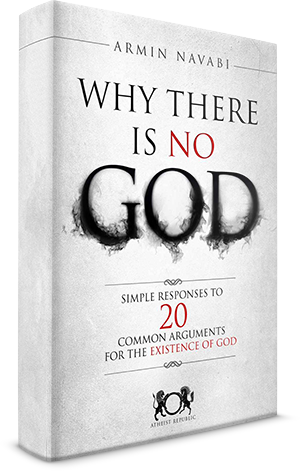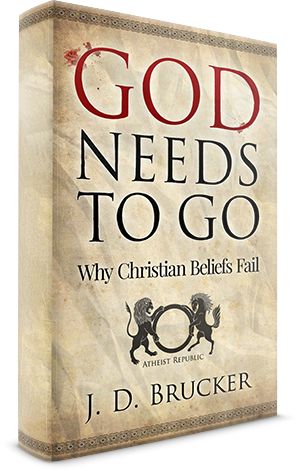Part of any religious teaching are the analogies. I forgot about these until I was directed to a religious pamphlet. The analogy used was “ Bad businessman steals from his own company (this guy represents Adam). The result is the company goes under and the employees lose their jobs. A good businessman (Jesus) comes along and invests in the company.... gets it on its feet and restores the town, jobs, etc”
Hmmmm....now I would make this a little more accurate. A sign should be posted at the company that a new owner is “coming soon”. The unemployed townfolk can still struggle to pay bills and feed their kids on the hope of the company reopening. Then they need to have flyers letting them all know what they need to do to get their job back... when it opens. Actually we’ll need a few different flyers with different information telling them how to behave (just for fun).
Now the analogy is a little more accurate....
What analogies did you use or hear that was suppose to strengthen your “faith”?
Subscription Note:
Choosing to subscribe to this topic will automatically register you for email notifications for comments and updates on this thread.
Email notifications will be sent out daily by default unless specified otherwise on your account which you can edit by going to your userpage here and clicking on the subscriptions tab.





























I come from the Catholic tradition.
The Catholic nuns and brothers who taught me were too arrogant and/or too stupid to use analogies, similes or metaphors except for two things: (1) To describe the pains of hell in simple language so my seven year old mind could grasp the horror.
(2) To justify the doctrine of Limbo, which we were taught. Limbo was that place unbaptised babies went if they died . They couldn't go to heaven, because they still had the stain or original sin. (really) Even very young children could see this was most unfair and said so.
The nuns patiently explained that limbo wasn't a punishment, that the babies were perfectly happy. An analogy was used. They said; Think of a bucket full of water and a thimble full of water. Both are full. The thimble is what it is like for the babies in limbo. The bucket is what it is like for those in heaven.
This was in the 1950's. The doctrine of limbo was in our printed catechism . It was quietly omitted a long time ago.
.
Holy fuck I’m confused?!?! Thimble of water? I don’t get the connection and a bucket.... does it “feel” the same because their baby minds don’t know where the fuck they are? Whoooaaa I can see why it was quietly dropped.
Bright side is... didn’t the Pope say atheists can now get into the bucket?
@whitefire
The analogy is actually quite clever. (smells of Jesuitical sophistry)
The point is that although the amounts of water (happiness) are very different, each container (the souls) has its capacity. IE is full.
The inference is that those with a thimble full of happiness would in no way feel deprived, and would be content.
Not sure, but I think there's a logical fallacy there .False equivalence.(?) . If I'm incorrect, would some one please correct me, as I'm not a strong philosopher. .
I would conclude that they’re in heaven if they have the same happiness...
I’d be in heaven if the bucket was full of vodka.
@Whitefire13
"I would conclude that they’re in heaven if they have the same happiness...
I’d be in heaven if the bucket was full of vodka."
Indeed, only they are not. Those with the thimble full are in Limbo, which is not heaven; that's the point.
Never did find out the scriptural authority for the notion of Limbo. I suspect it's one of the many christian inventions, like that of an eternal hell.
@ Cranky it is ion the four levels of Hell....just never ever made it into the official Catholic Theology.
Augustine of Hippo I think first argued for the "Purgatory of Infants (Limbo) the mildest level of hell for those infants that died unbaptised. From memory it was when he was having a battle with Pelagius over the concept of original sin.
Because it never made it into the official doctrine anyone could (and oftime did) write what they wanted to about it. Abelard and later WyCliffe spring to mind ( I did read about this interesting theological byway some (many) years ago and I am guided by memory) alone.
It was never adopted but curiously, officially dropped by the Church in the 1950's. But some still liked the idea and continued preaching the "place where the infants were not punished but rather just denied the vision of god until the Day of Judgement". Gives bereaved parents of the Faith some morsel of reassurance that their child was not being tortured for eternioty at the hands of a "loving god" I guess.....
@Old man shouts
Really. Gee, I didn't know that. (and I bet nor did any of my teachers) Thanks.
Are you alluding to Dante? Have never read him.
I worked out my own definition of hell whenI was about 16. My teachers lacked the wit to refute it. IE "Hell is that place where god is not"
@ Cranky
I think it was Abelard who defined infants Limbo ...paradise but without the ability to see god - I just had to look it up, did I not? Peter Abelard (1079–1142) said that these infants suffered no material torment or positive punishment, just the pain of loss at being denied the beatific vision. Others held that unbaptized infants suffered no pain at all: unaware of being deprived of the beatific vision, they enjoyed a state of natural, not supernatural happiness. This theory was associated with but independent of the term "Limbo of Infants", which was forged about the year 1300.[WIKI]
No Dante's vision of Hell is a different subject. You made me refresh my memory on that one too.....Dante stole from Abelard and the the others I mentioned (never did think he was original the old fraud) viz:
"Limbo was the first circle of the Inferno proper. Limbo was on the outer boundary of Hell, just across the River Acheron. Here remained those who were not sinful in life, but did not acquire the proper portal of faith (baptism). As such, they are punished only by being exiled from God's presence forever.
Note; Dante added "forever" contradicting the gentler writers of earlier ages. But then Dante was an asshole by all accounts.
@Old man shouts
I guess I shouldn't be surprised at just how much the Christian have borrowed, stolen, incorporated and invented over the course of 2000 years,-and that they're still doing it--.
Regardless of the historicity of Jesus, I have though for some decades that the New Testament has little if anything to do with its putative historical founder. (still thinking about Paul) In fact, I think the historicity of Jesus is irrelevant to the morass of mythology, superstition and lies which today is called "christianity" ------ the Catholic church's reaction to the Nag Hammadi texts shows just how hide bound the church is, with a nifty bit of sophistry ; if [say} the Gospel of Thomas was revealed text it would agree with doctrine but it doesn't so it isn't [so there]
Facts and reason can never be permitted to triumph over a mythology which is accepted by millions at a visceral level. Such would destroy their world view ,and that can never be permitted .
I'm beginning to think that our ability for cognitive dissonance may be hard wired as a survival mechanism.
Are are we humans a more rationalising than rational species?
Old man shouts... you is smart! Lol. Seriously, I loved reading your post.
Yah - we can hold the two opposing thoughts. It’s weird really, but it makes us “feel” good. We lie to ourselves and somehow convince ourselves it’s not a lie.
Trying to cut out all the dissonance is difficult...so I’ve settled on the happy small doses.